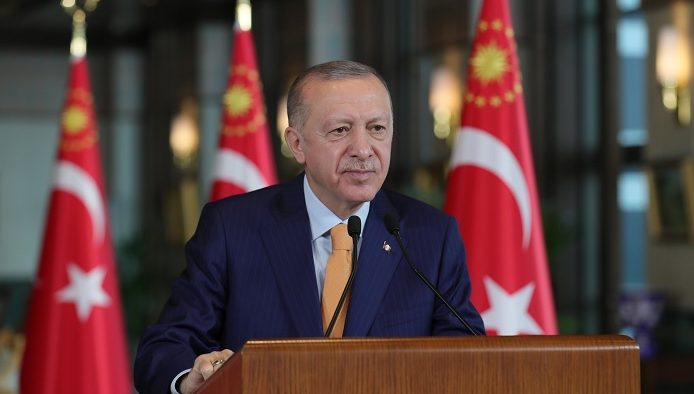Turkey could approve Sweden’s NATO bid if EU allows Ankara to join EU: Erdogan

Online desk: Turkish President Recep Tayyip Erdogan on Monday introduced a new condition for approving Sweden’s membership in NATO, calling on European countries to “open the way” for Turkiye to join the European Union, reports AP.
The surprise announcement by Erdogan before departing to a NATO summit in Lithuania’s capital added new uncertainty to Sweden’s bid to become the alliance’s 32nd member, which Turkiye initially blocked saying Sweden was too soft on Kurdish militants and other groups that Ankara considers security threats.
It was the first time that Erdogan linked his country’s ambition to join the EU with Sweden’s efforts to become a NATO member.
“Turkiye has been waiting at the door of the European Union for over 50 years now, and almost all of the NATO member countries are now members of the European Union,” Erdogan told reporters in Istanbul.
“I am making this call to these countries that have kept Turkiye waiting at the gates of the European Union for more than 50 years.” “Come and open the way for Turkiye’s membership in the European Union. When you pave the way for Turkiye, we’ll pave the way for Sweden as we did for Finland,” he added.
Earlier, Erdogan’s office said he told US President Joe Biden during a telephone call Sunday that Turkiye wanted a “clear and strong” message of support for Turkiye’s EU ambitions from the NATO leaders meeting in Vilnius.
The White House readout of the Biden-Erdogan call did not mention the issue of Turkish membership in the EU.
Erdogan and Swedish Prime Minister Ulf Kristersson were expected to meet later Monday in Vilnius.
Asked about Erdogan’s comments, NATO Secretary-General Jens Stoltenberg said he supports Turkiye’s ambition to join the EU but noted that it wasn’t among the conditions listed in an agreement that Sweden, Finland and Turkiye signed at last year’s NATO summit in Madrid.
Stoltenberg reiterated that Sweden had met those conditions and said he thinks it is “still possible to have a positive decision” on the country’s pending membership during this week’s summit in Lithuania.
Turkiye is a candidate to join the EU, but democratic backsliding during Erdogan’s presidency, disputes with EU-member Cyprus and other issues have held up the country’s progress toward admission in the 27-nation bloc.
However, as a member of NATO, Erdogan’s government has postponed ratifying Sweden’s accession to the alliance, saying the administration in Stockholm needs to do more to crack down on Kurdish militants and other groups.
A series of anti-Turkiye and anti-Islam protests in Sweden’s capital raised doubts that an agreement to satisfy Turkiye’s demands could be reached before the alliance’s summit.
Turkiye’s delays on Sweden’s accession has irritated other NATO allies including the United States. Biden’s national security adviser Jake Sullivan confirmed on Sunday that Biden and Erdogan had spoken earlier that day about Sweden’s NATO membership among other issues and had agreed to meet in Vilnius for further talks. Sullivan didn’t mention the EU membership issue.
He said the White House is confident Sweden will join the alliance.
“If it happens after Vilnius — we’re confident it will happen,” he said. “We don’t regard this as something that is fundamentally in doubt. This is a matter of timing. The sooner the better.” Erdogan’s latest comments stunned seasoned Turkiye analysts.
“Erdogan has introduced new demands and moved the target repeatedly throughout this process, but trying to put pressure on the EU over a NATO matter is rather spectacular,” said Paul Levin, director of the Institute for Turkish Studies at Stockholm University.
“However, I think that we should interpret his remarks with caution for now. They could signal everything from setting the stage for a face-saving OK to Sweden, to an attempt to sabotage the NATO enlargement process by raising impossible demands,” Levin added.











